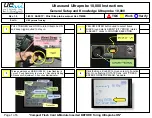
FIRST-TIME SETUP
USING THE FAULT FINDER
The Fault Finder needs to be set for either positive
or negative
polarity
voltage pulses from the energizer.
1. Go close to where the energizer leadout wires connect to the main fence.
2. Hook the Fault Finder wire location slot onto an un-insulated section of the
live leadout wire and press
.
If the current direction arrow points away from the energizer the polarity
setting is correct and no further adjustment is required.
If the current direction arrow points back towards the energizer then the polarity
setting of the Fault Finder must be changed.
3. Do this by first moving the Fault Finder away from the fence so that no fence
pulse can be detected.
4. Press and hold
. Either
or
will be displayed. After 10 seconds the
Fault Finder will beep and will change. After 5 more seconds, another beep
and
or
will change. (The will also reset to what it was.)
5. Hold the wire location slot onto the fence wire and press
. The current
direction arrow will now point away from the energizer.
For another fence that is powered by a different type of energizer, you must
check the polarity again.
1. Start close to where the energizer leadout wires connect to the fence, and
hook the wire location slot onto the fence wire.
2. Keep a firm contact and press
.
3. Note the current reading.
4. Work down the fence line and take readings at regular intervals and at any
junction points. The previous current reading shows briefly in the top right of
the screen for comparison. At a junction, follow the branch with the
abnormally high or low reading.
After using the Fault Finder several times, you will come to know the normal
current and voltage readings around the farm.
5. If the current reading falls suddenly along a fence branch, there is probably a
fault between this and the last reading. Retrace to find the fault.
Current readings higher than normal indicate fence short-circuits. Lower than
normal readings may mean a poor connection or fence break.
On an earth wire return fence (example B below), readings taken on the earth
wire show the current going back to the energizer at low voltage.
HOW IT WORKS
CARE
Current flows through the path of least resistance. If the fence has a short-
circuit, more current will flow. Large flows of current load the energizer and
fence, causing lower voltage readings.
Use the Fault Finder to detect where the current is flowing, and locate the current
‘leaks’ in the fence system. Fixing the leaks raises the voltage in the fence,
giving it more shock power.
Do not leave the Fault Finder in direct sunlight like on a vehicle dashboard.
Clean the Fault Finder only with a damp cloth.
If the Fault Finder gets wet, wipe it dry and place face down to allow any water
to run out of the speaker grill. The Fault Finder is water resistant and should
require no further attention.
Energizer
Energizer
Energizer
Energizer
6 A
26 A
30 A
0 A
0 A
0 A
0 A
NO FAULT
FAULT
NO FAULT
FAULT
0 A
A
A
B
B
22 A
3 A
3 A
3 A
2 A
0 A
24 A
5 A
25 A
FAULT FINDER
FAULT FINDER
TM
speedrite
®
by
7 A
7 A
6 A
0 A
30 A
30 A
24 A
0 A
E
a
rt
h
w
ir
e
re
tu
rn
Si
n
g
le
e
le
ct
ri
c
w
ir
e




















